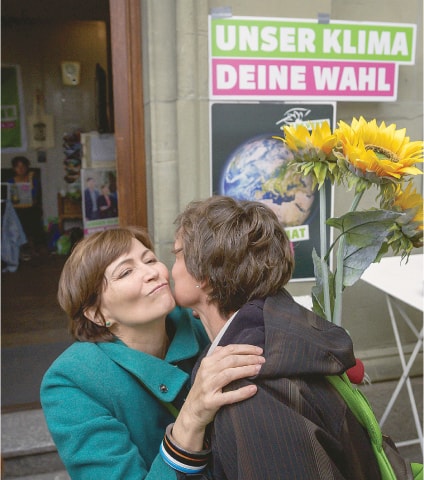
GENEVA: Switzerland’s Green Party made historic gains in national elections on Sunday, while the anti-immigrant right wing was on track to remain the largest party in parliament despite a slip in its support.
Ballots were still being counted in the wealthy Alpine nation, but projections released by national broadcaster RTS confirmed the “green wave” forecast before the vote.
“We have clearly beaten our expectations,” Green Party vice president Lisa Mazzone told RTS.
“We are tremendously pleased that the mobilisation we saw on the streets has translated into votes. We are heading towards a historic score,” she added.
The Greens garnered 13 per cent support, exceeding their pre-election projection. It marked a six-point bump on their 2015 performance, according the projection by RTS, political research firm Gfs Bern and national press agency ATS.
The Green Liberals — an environmentalist party with libertarian socio-economic policies — also gained ground, taking 7.6 per cent of the vote compared to less than five per cent in 2015.
Surveys before the election suggested that climate change had displaced migration as the top concern among the electorate, in what the Sotomo political research institute described as one of the most significant shifts in recent Swiss political history.
The Swiss People’s Party (SVP), which has repeatedly been accused of demonising migrants, claimed 25.6 per cent of the vote, according to the RTS projection.
But that is down from the 29 per cent it garnered in 2015.
University of Lausanne political scientist Oscar Mazzoleni said that even a two-per-cent drop would mark “a failure” for the SVP, and further demonstrate that it is struggling to attract young voters to replace its ageing electoral base.
The SVP is also the only major party that has not pledged to pursue bolder climate action, having consistently denounced “climate hysteria” in Swiss politics.
“We knew were going to suffer a setback,” outgoing SVP senator Oscar Freysinger said on RTS.
“But the important point remains that before saving the planet we have to save Swiss sovereignty,” he added.
Aside from warning about the threats of immigration, the SVP has also built its brand by condemning the influence of the European Union in non-EU member Switzerland.
‘Magic formula’
Speculation will now centre on whether the Greens can force their way into the executive branch for the first time.
Under Switzerland’s unique political system, the election decides the 200 lower house lawmakers and 46 senators elected to four-year terms, but the make-up of the executive Federal Council will not be decided until December.
The country’s so-called “magic formula” sees the council’s seven cabinet positions divided among the four leading parties.
Currently, six cabinet seats are shared equally between the SVP, the Socialist Party and the right-leaning Free Democratic Party, with the centrist Christian Democrats holding the seventh seat.
The presidency rotates each year.
The Greens look poised to finish fourth, narrowly beating the Christian Democrats, but it remains unclear if they will demand a cabinet slot.
Analysts have said that an alliance of the two main environmentalist parties would be well placed to join the government, but they question whether the left-wing Greens and libertarian Green Liberals could agree on a unity candidate.
Overall, the results provided further evidence that a nation where the economy and lifestyle are closely tied to the country’s stunning snow-capped peaks has grown increasingly concerned about the ravages of climate change.
A recent study by Zurich’s ETH university found that more than 90 per cent of 4,000 glaciers dotted throughout the Alps could disappear by the year 2100 if greenhouse gas emissions are not curbed.
Greenpeace said in a statement that Sunday’s results gave the new Swiss parliament “a clear mandate. The climate crisis is the greatest threat to our country, and the measures to overcome it must be at the centre of political work.”
Published in Dawn, October 21st, 2019














































Dear visitor, the comments section is undergoing an overhaul and will return soon.